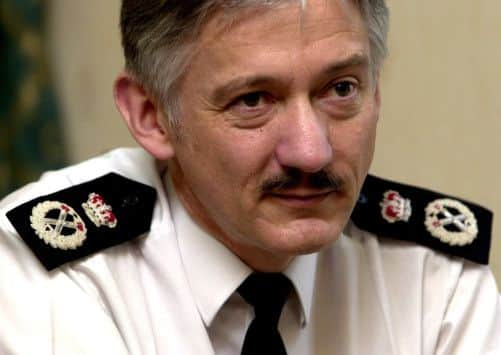Exclusive: Police may face charges over Yorkshire supergrass scandal


The solicitor representing a man whose murder conviction was quashed because of serious police wrongdoing has written to Keir Starmer to press for charges to be brought against police officers who showered supergrass Karl Chapman with a catalogue of improper rewards and lied in court.
A Yorkshire MP has also raised concerns West Yorkshire Police appear to be “above proper investigation” and criticised the lack of any independent scrutiny of why no officers were ever disciplined.
Advertisement
Hide AdAdvertisement
Hide AdThe force itself decided not to take disciplinary action and was then able to investigate whether its own decision was right – before concluding it was. A deputy chief constable from the Association of Chief Police Officers (Acpo) then rubber-stamped West Yorkshire’s findings, adding that the conduct of an officer who obtained numerous improper inducements for Chapman and perjured himself in court would have warranted – at most – only a written warning.


Matthew Gold, representing Daniel Mansell whose 1998 conviction for murdering Wakefield pensioner Joe Smales was quashed in 2009, said: “The West Yorkshire officers responsible for the prosecution of Daniel Mansell have not been held to account for the most serious misconduct. This is despite repeated investigations into the misconduct.
“The Supreme Court made clear the severe level of misconduct... yet no-one has been held accountable.
“As Daniel Mansell does not have any faith in how this whole shocking episode has been handled, we have written to the Director of Public Prosecutions requesting that consideration is given to bringing criminal charges against the officers. The opportunity to bring criminal proceedings has not been lost.”
Advertisement
Hide AdAdvertisement
Hide AdThe Crown Prosecution Service (CPS) decided, in 2005 and 2006, that there was insufficient evidence to bring charges after receiving files from North Yorkshire Police on more than ten officers.
In 2011, the Supreme Court delivered withering criticism of West Yorkshire Police when it ruled Mr Mansell’s brother – Paul Maxwell – should face a retrial after his conviction for the Smales murder had also been quashed. Maxwell subsequently pleaded guilty.
The court’s judgement detailed some of the misconduct which included Chapman being allowed access to heroin and alcohol, being taken to a brothel, having a relationship with a policewoman and being given thousands of pounds in rewards he wasn’t entitled to.
Chapman, a career criminal, had been in the custody of the police during the mid and late 1990s providing information and giving evidence in court against Gary Ford, a former accomplice in a raft of robberies and burglaries, as well as Maxwell and Mansell.
Advertisement
Hide AdAdvertisement
Hide AdA lengthy North Yorkshire Police inquiry found officers had concealed Chapman’s treatment from trials in which he was the key prosecution witness. The majority of convictions against Ford were also quashed as a result.
The Supreme Court judgement, which included incredulity no officers had been charged or disciplined, prompted a fresh inquiry by West Yorkshire Police into its decision not to discipline any officers and whether any evidence existed for fresh misconduct action.
Last year Cambridgeshire deputy chief constable John Feavyour reviewed and supported the force’s finding that its original decision was correct.
No officers faced action because it was considered unfair for more junior officers to be disciplined when senior officers had been able to retire and because of the time-lapse between the misconduct and when disciplinary files were received in 2006.
Advertisement
Hide AdAdvertisement
Hide AdBut Dewsbury MP Simon Reevell criticised the failure to discipline any officers and questioned the findings of the recent inquiries, detailed for the first time in today’s Yorkshire Post. He said: “It is concerning that West Yorkshire Police has investigated itself when looking at why no-one was disciplined and a senior police officer from another force has then reviewed the findings. It is far too cosy and at no stage has there been any independent scrutiny of what happened.
“I am particularly concerned that a deputy chief constable would find junior officers should not be disciplined if more senior officers were ‘off the hook’ because they had been able to retire.
“The junior officers involved were experienced and in some cases faced allegations of serious misconduct. In comparison, it is hard to conceive of a police force deciding not to pursue lower or mid-level criminals on the basis that they couldn’t get ‘Mr Big’ at the top of the chain.
“There is too much of a sense that somehow West Yorkshire Police have been above proper investigation. If the new police commissioner’s team are serious about moving away from that they should be open about the past, be open about who made decisions and make clear, publicly, that not disciplining officers in such serious cases of misconduct is not acceptable.”
Advertisement
Hide AdAdvertisement
Hide AdWest Yorkshire Police Commissioner Mark Burns-Williamson last week set up a “root and branch” inquiry into misconduct procedures.
The inquiry came in the wake of a previous Yorkshire Post exposé on the supergrass scandal and a widespread view that the force’s recent inquiry into its dealings with serial sex abuser Jimmy Savile was not as comprehensive as it should have been.
The commissioner did not respond when asked to comment. West Yorkshire Police declined to comment.
Mr Gold has asked Mr Starmer to provide written reasons why the CPS decided no officers would face criminal charges. The CPS decision could subsequently be challenged by judicial review.
Advertisement
Hide AdAdvertisement
Hide AdBoth Mr Mansell and Mr Ford have launched civil claims against the police which could result in more than £500,000 in total being paid out in damages.
Mr Mansell spent 12 years in prison before his conviction was quashed in 2009. Mr Ford was originally sentenced to 25 years in 1996 for a catalogue of burglaries and robberies. His sentence was reduced to 11 years in 2009. Mr Ford spent 15 years in prison which, including time on remand and potential early release, would otherwise have been seven years.